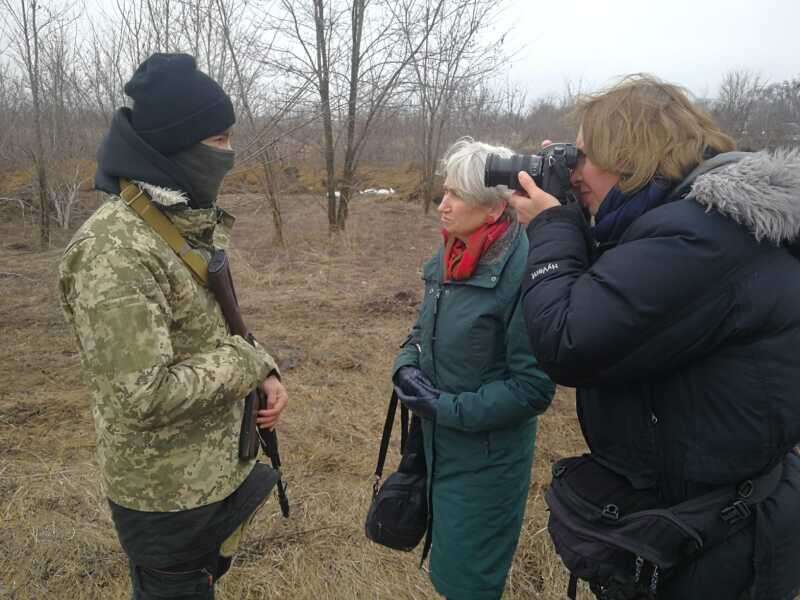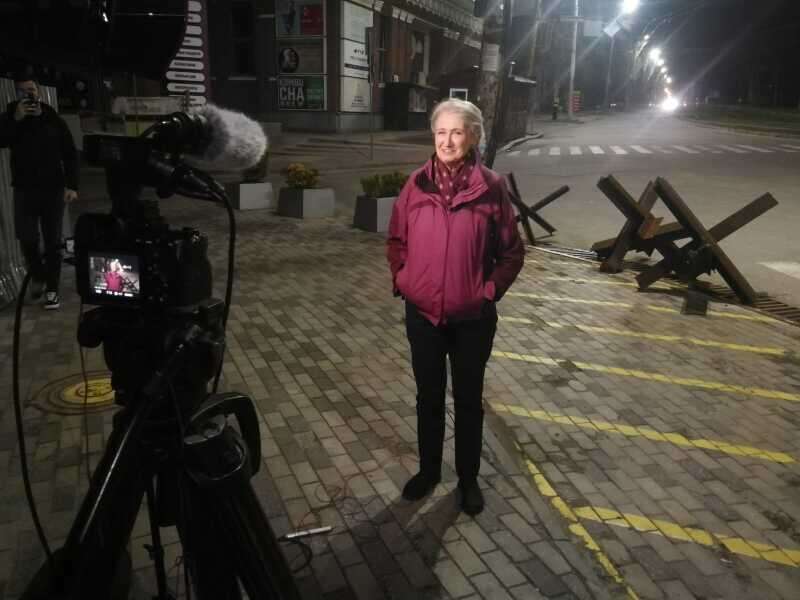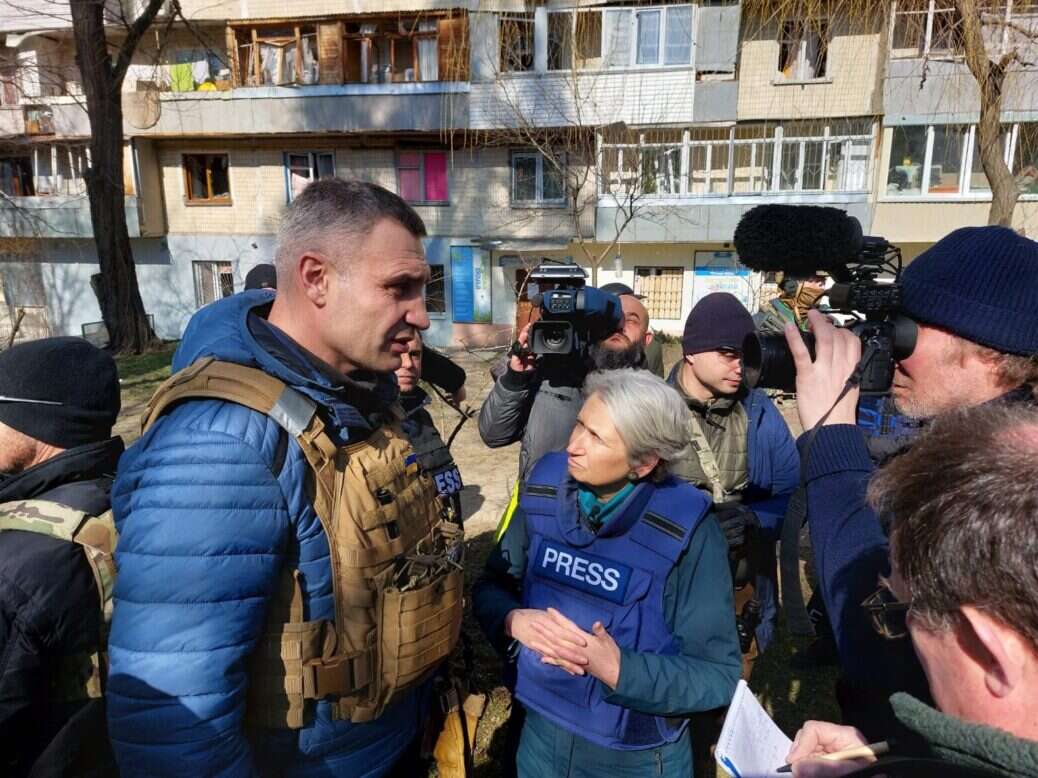
Channel 4 News international editor Lindsey Hilsum has written for Press Gazette after returning to Ukraine.
She shares the terrifying moment her team drove over shrapnel and had to change a tyre against the “faint thump of artillery”.
She also reveals the stories that “make reporters look braver than we really are” – compared to the ones that she believes really matter.
I’m back in Ukraine after nearly a month away, and it’s not a day too soon. A story like this is hard to leave behind. I’m also back exactly where I last reported from in late March: the carpark in Zaporizhzhia where people fleeing Mariupol arrive. Now their accounts of life under constant Russian bombardment are even more desperate.
We talk to teenagers who’ve been living in a bunker for two months. In another life, Bohdan, who is 17, and his 16 year old brother Ruslan, could be in a boy band – they have quiffs and a certain fresh-faced look. Bohdan raises his fist and shouts “Slawa Ukraine!” – Glory to Ukraine! – to the waiting cameras as he gets off the bus. He tells me in a matter-of-fact way that both his mother and grandmother were injured in the shelling. Russian soldiers stripped the brothers to their underpants and interrogated them. He says they only avoided forced conscription because they were under 18.
After talking to us they go to a tent set up by local volunteers and fall on bowls of stew as if they haven’t had a hot meal in months. Maybe they haven’t.
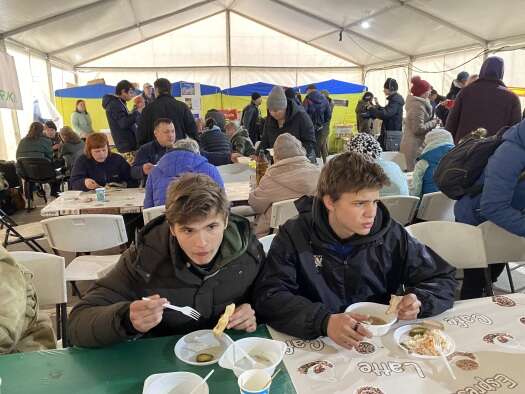
Bohdan and Ruslan with their stew in Zaporizhzhia, Ukraine. Picture: Lindsey Hilsum
The shadow of Bucha hangs long over Ukraine. The brutality meted out by Russian soldiers to Ukrainian civilians in the towns northwest of Kyiv has hardened attitudes – there’s a grim determination amongst people I meet this time, a sense that Ukraine must prevail because the alternative is too awful to contemplate.
The British Defence Secretary, Ben Wallace, tells Channel 4 News that the atrocities have made Western countries more willing to provide military aid, but it’s clear that something more is at work. Western countries over-estimated the Russian military. They believed that Kyiv would be taken in a matter of days. They were wrong. Now the US is preparing a massive package of military aid with the aim not just of defending Ukraine but of weakening the Russian army for a generation.
It’s a risky strategy. It may prolong the war, or provoke Putin. Nonetheless most Ukrainians I meet welcome anything that can help them not just resist but defeat Russia.
Following the Russian retreat from north of Kyiv, the war has moved to the east. I’m amazed that so many Ukrainians remain in or return to villages that are constantly being shelled. In the frontline village of Kam’yans’ke, south of Zaporizhzhia, we come across Lina and Yakiv, a young couple who left but are returning to bring supplies to old people who stayed behind.
Lina’s father, Leonid, was in the kitchen of their house when a rocket hit on March 4th. He was killed instantly. Amongst the debris, a jar of pickles sits untouched on the counter. A frying pan is still on the hob. It’s as if the moment of impact has been frozen in time. A picture of Leonid’s wedding to Lina’s mother hangs undamaged on the wall. Outside, white apple blossom and scarlet tulips are blooming just as they did last spring, when Lina’s parents can never have imagined that their peaceful village life would be prematurely ended by a Russian shell.
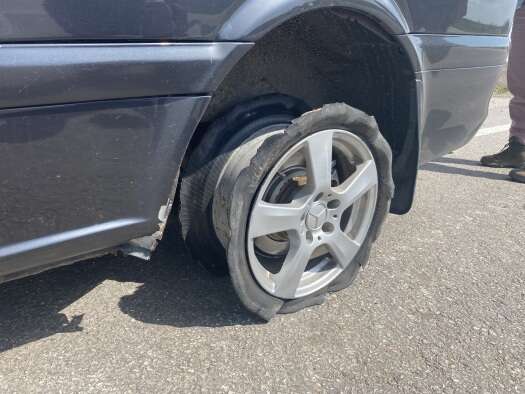
The shredded tyre. Picture: Lindsey Hilsum
On the way back from the village, our minivan lurches to the right with an ominous grinding noise. It’s not just a flat but a shredded tyre; only tatters remain on the rim. We have driven over shrapnel.
As we pile out, we can hear the faint thump of artillery. Our driver, Viktor, changes the wheel in 10 minutes. Back at the hotel, over a drink, he says that he was terrified we would be hit and it would be his fault for taking too long. We tell him that it would absolutely not have been his fault. More than that, he has a future in Formula One – he’s the fastest wheel-changer we’ve ever seen.
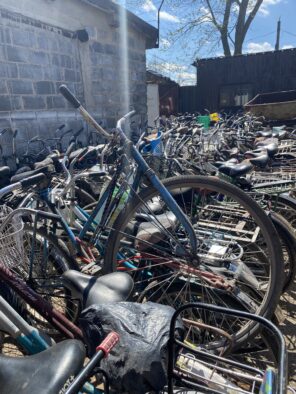
Bicycles in Kherson, Ukraine. Picture: Lindsey Hilsum
We want to find out more about life under Russian occupation, so we head to Zelenodolsk, where people are arriving from Kherson, the first area to be seized by the Russians, back at the beginning of the war. Russian soldiers stop cars and interrogate the passengers, so many people escape by bike or on foot, winding through back roads. We film a compound where the local authorities have collected thousands of bicycles, piled on top of each other with buggies and the odd wheelchair.
As we’re talking to those who arrived that morning, an old man with a bandage round his head and a bruised face limps up. His name is Oleksander. A few days earlier, three drunken Russian soldiers barged into his neighbour’s house, stole food and demanded vodka. When he remonstrated with them, they beat him with an axe handle. He seems utterly bewildered.
It’s stories like Oleksander’s that I want to tell. The “bang bang”, the terrifying moments when a round lands nearby, make for exciting television. They bring home to the viewer the reality of war – and they can make reporters look braver than we really are. But the experience of people like Oleksander is not just “the human story”. This is what reveals the nature of this invasion, the brutality and injustice being visited on the people of Ukraine. People like him are the reason that we’re here.
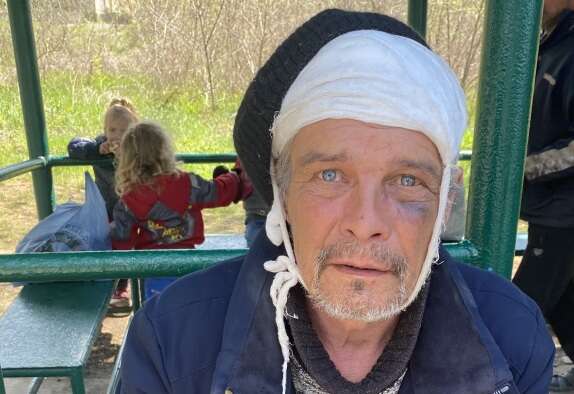
Oleksander in Ukraine. Picture: Lindsey Hilsum
Read our previous correspondent diaries from Ukraine:
- Sky News presenter Mark Austin part 1: ‘We need to be here’
- Mark Austin part 2: Hotel staff told Sky News team ‘God bless you all for coming’
- 5 News chief correspondent Tessa Chapman: ‘We couldn’t make sense of what we were seeing’ at border
- John Sweeney on reporting freelance from Ukraine: ‘This really is evil versus good’
Email pged@pressgazette.co.uk to point out mistakes, provide story tips or send in a letter for publication on our "Letters Page" blog

